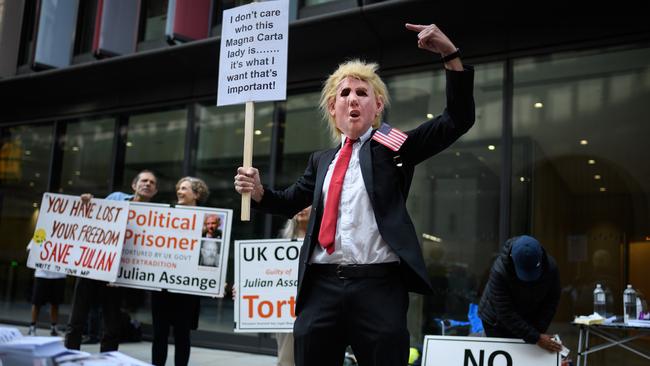Julian Assange, like Jeffrey Epstein, may not be safe in US prison
Julian Assange’s lawyer says he had low confidence the Australian would be safe from harm in a US correctional centre.

Julian Assange may not be safe in a US correctional centre, like the now dead accused sex trafficker Jeffrey Epstein, a London court has been told.
US lawyer Tom Durkin, a defence counsel of 47 years experience, told Assange’s extradition hearing in the Old Bailey that he had low confidence that the Australian WikiLeaks founder would be safe from harm because like Epstein, Assange likely has private compromising information on many powerful people.
In his written testimony, contested fiercely by the US prosecutors, Mr Durkin alleged that Assange, medically assessed as facing serious depression and Asperger’s Syndrome, will not receive adequate mental health care in a US prison.
Mr Durkin said the operating procedure around suicidal prisoners in US correctional facilities has failed.
“Jeffrey Epstein, then one of the highest profile prisoners in the US prison estate who was famously accused of sex trafficking and awaiting trial, committed suicide while ostensibly being guarded continuously in the Metropolitan Correctional Centre in New York; the two cameras that were supposed to be filming his cell malfunctioned the night he did so.
“Mr Epstein was reported to have private, compromising information on many powerful people, just as Mr Assange likely does. My confidence that he (Assange) will be safe from harm —whether inflicted by himself or others — is low.’’
Epstein was found dead in his cell on August 10, 2019 and his death was ruled a suicide by hanging by the New York medical examiner. However Epstein’s lawyers believed the evidence was far more consistent with murder.
Mr Durkin also told the court that Assange would have to reveal sources who provided data and information to WikiLeaks if he agreed to any US plea bargain.
He said a realistic assessment of Assange’s sentencing, if found guilty on the current indictment, would be 30 to 40 years or an effective life sentence given Assange was 49 years of age. He said there was a “trial tax’’ which offers an incentive to plead guilty. “You get penalised for going to trial,’’ he said.
Mr Durkin said that any plea deal would involve Assange’s full co-operation with the authorities including revealing sources of information given to WikiLeaks.
“Absolutely, co-operation always has to be what government requires: complete full and truthful,’’ he told the court.
Mr Durkin said pleading guilty could reduce the sentencing by three levels, but based on his experience he believed Mr Assange’s sentencing would be in the highest ranges of the Federal sentencing levels of level 38 to level 43, which translates to 235 months to a life sentence.
Earlier another experienced US lawyer Eric Lewis warned that the latest US indictment, issued two months ago expands on the earlier 18 charges and has exposed Assange to ever greater jail terms.
He said the US sentencing judge would look to adjust any sentence because the latest indictment broadens the charges to involve activity involving extensive participants, another involves a teenager, another involves a specialist skills such as his computer technical skills and another could involve obstruction while trying to prevent the identification of Chelsea Manning as a source.
He added that a further adjustment could be made if government officials are identified as a result of the WikiLeaks disclosures.
He said the court has power to accumulate the 18 counts but not above the maximum term of 175 years.
He agreed there was a real risk Assange would spend the rest of his life in prison.
The trial continues.







To join the conversation, please log in. Don't have an account? Register
Join the conversation, you are commenting as Logout